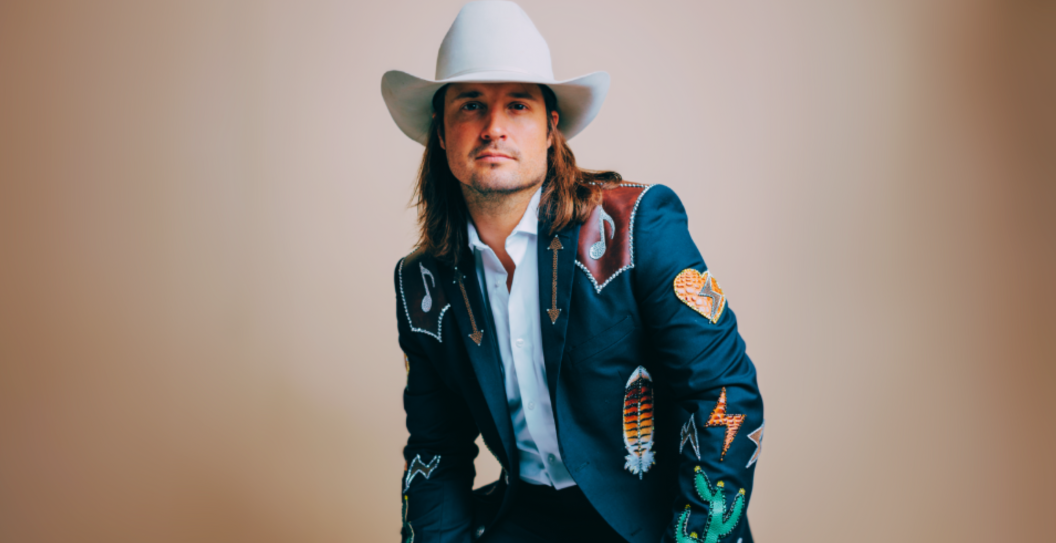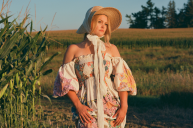Ross Cooper's Lightning Heart was originally conceived as an acoustic record. Coming out of the pandemic, the Lubbock, Texas native rooted his record in "whatever catharsis I was trying to find," he says.
"When I really started putting these songs together, I was like, 'Oh, this feels like it needs to be a full production.' A lot of these songs forced me to dive a little deeper and explore some of those topics," he adds. Across the 13-track project, Cooper explores matters of the heart, from loneliness to heartbreak and even death. Where the title track speaks to his heart condition and musings on death, "Smoke Screens" is a real moody heartbreaker. Lightning Heart (produced with Josh Serrato) arrives as Cooper's creative magnum opus. Raw honesty permeates every inch of the record, dusted with some of his most probing songwriting to date.
"I was in more of a vulnerable spot, creatively," he continues. "I didn't know if anybody was gonna hear these songs. It was, in a way, a good thing of getting back to the root of it - of writing songs because I felt like it was something I needed to do because it either brought me joy or it felt like it was healing."
Wide Open Country caught up with Cooper to chat about musical inspirations, thoughts of death, and growing older.
There's such a wistfulness to the record, even down to the musical choices. What color palettes did you draw from?
I've never heard it put that way. It kind of naturally fell out. I've always used the studio musicians on my records and whatnot. I produced a friend of mine's EP a couple of years ago which gave me an opportunity to use my band. I've been so lucky that my band is so talented. Doing that record was a good litmus test to see if I wanted to use my guys on my album. I already kind of knew that I did, but they knocked it out. First of all, they're great pickers. There is a [belief] that if you're living in Nashville, then why not use the hottest pickers in town. There's enough of them for sure. Well, it was this thing where my band is super talented. When you're around these people every single day, nobody's gonna care more than that group of people in the room. They're having to suffer through me going crazy in the van, showing them new songs. So, the people in the room were the best people with a set of paintbrushes to be able to paint that picture. It's really helpful that the guys who played on the album know me better than most people do. They know my personality, and they know my songwriting. As a consequence, I think that we probably ended up with a record that feels the most me out of anything that I've done yet.
In the title track, you sing, "All that living can feel like dying." Do you find that lyric to be true to life?
So, I have this heart condition. It's not super serious. It's curable with procedures, but I've had two procedures, and it's not cured. When it hit, I didn't know what was happening. The first time it really happened, I was in Atlanta and playing a show. I felt like I was having a heart attack. I didn't know what was going on. My heart was racing, it was uh, you know, somewhere in the 230-240-250 range BPM. I went to urgent care and tried to figure out what was going on. They had misdiagnosed it as asthma. Well, I'm not wheezing; it's my heart. My heart was racing so much, and it was hard to breathe. So, they gave me an emergency inhaler, which is a steroid that was essentially making it worse. Then, I finally went to Centennial Heart in Nashville. I have an arrhythmia, and I go into SB [sinus bradycardia], so I can go from resting heart rate - and I have a low one - to two hundred in half of a second. When that happens, you feel like you're having a heart attack.
And so, it was a difficult song to write because I didn't know how to convey that. I might not be here tomorrow, but trying to capture a feeling of that process was really difficult. I knew I wanted it to be the title track, and it was the song that was the biggest pain in the ass. [laughs] It took probably a year and a half, two years to write. Every time I would write an iteration of it, I knew that it wasn't there yet. Then, I finally got it and I was like, 'OK, this song is done, and done to a point where it's like, OK, no, maybe nobody likes this. But that doesn't matter. I've scratched this itch that I was chasing. And I know that for me, the song is complete. It gave me this big sigh of relief. Usually what happens is I'll write a song and I'm like, 'oh, that's the title track,' and I'll build the rest of the record around it. This song was different. I knew that I wanted this to be the title track, but I hadn't written the song yet [laughs] I just kept chasing it and chasing it and chasing it, and thank God I finally got it.
While undergoing this medical scare, did you think a lot about death?
Well, initially. I was like, 'What if I am having these, little mini strokes?' I would see black clouds. My head would get really lightheaded, and I was like, 'I'm gonna pass out at any moment. Then, even after we got it identified, there was still this reflection of mortality for the first time in my life. I feel like most media and journalists that I've talked to - the pretty obvious story with me is my rodeo background. You're one of the first people to write about it. There's inherent risk and danger that comes with that. But it's an extreme sport, you know what I mean? When you're looking at something like a heart condition, it's like, 'Oh shit, yeah, this is serious, something that I don't have control over. What if I'm not here tomorrow? And what does that look like?' Now, I have a wife. When you're living for someone else, it's not all about you. It really does put it in perspective. The older you get, you feel a little bit more of that weight.
It's like, 'What if I'm not here? How am I living? If I were to not wake up, how I'm living right now is.... am I proud of this? If anything, it served its purpose of making me ask that question. As it turns out, when we got it identified again, it was not a life-threatening thing. But having said that, I've had two procedures that didn't take, and I'm not in a real big hurry for people to go root around and burn more parts of my heart.
You mentioned growing older. In "Bluestem," you have the lyric: "Growing up's supposed to take a while." What's been your experience with time as you've aged?
It makes me think of my dad. My dad retired a couple of years ago, and he's a guy that doesn't have a lot of hobbies. Me and my brothers have kind of stayed on his ass. He is one of the most fun people to be around, period. Everybody loves him. I don't know anybody who doesn't like him. He's got this big personality. I was lucky to have him as a role model because he was one of those people that just worked his ass off all his life. But he was still so much fun to be around. A lot of those guys from that generation work themselves into the ground, and a lot of their life is miserable. That line for me is a reflection of - you live in Nashville too long, it's one of those things you can get jaded pretty quick. You look up, and all of a sudden it's like a decade's gone by. Having that reminder of 'growing up's supposed to take a while,' it's okay to not have everything figured out. And it's also okay to allow yourself to enjoy the little things that make you happy. It doesn't have to always be so fast. It doesn't have to be so bleak. For a lot of people, just life, adulthood, et cetera, whatever you wanna call a career, just kind of takes over and a lot of people lose that spark. Well, you don't have to, you know. So, that song is a reminder for me.
What's the experience of documenting your life like a time capsule through releasing records?
You hit the nail on the head. I think that's exactly what a record is. You know, it's a record of where you're at in your life at that time. And that to me nowadays is more important. I put up my first record when I was 18, and thank goodness you can't find it anywhere. [laughs] Your priorities are different. when I was 18, I wanted to be a rock star or whatever. And those songs probably reflected a lot of that. Now, I feel like I've developed a voice as a songwriter. I owe it to myself. This is the artist I am and the type of art that I'm putting out, then I owe it to myself, the craft, and the people listening to be as honest with myself and with them as possible. It's great to have a snapshot of where you were in your life at that time. I think every songwriter at some point, for whatever reason, will lose pride in previous work. As the craft develops, it never stops developing. The older you get, the only thing that really happens is, you really figure out less is more. As long as you can remind yourself that, craft aside, records are that snapshot of where you're at, then you can always be proud of a body of work. So I love that. It's that a record is where I'm at in my life. I've never been good about keeping a journal, and I should. But these albums have been good, full journals.
In "Sad Crowd," you sing, "A lonely man who's never alone." While touring so much and putting out records, is that something you feel often?
Not so much now. But I absolutely have. This one's just a sad little, country song that could have shown up somewhere between The Flying Burrito Brothers and into the late '80s or early '90s. It has that thing that country music did back then. There are a couple of those types of bars where the jukebox doesn't even have a happy song in it type of thing and everybody in there is a kindred, sad spirit. I think it's easy to find yourself in a lot of those places. And one of these things happens where you're like, 'Oh, this is a cool place,' or you're like, 'Jesus Christ, I need to get out of this place.' [laughs] It's a heartbreak song and [about] being surrounded by a bunch of downers that are in the same spot for different reasons.
One of the standouts from a musical standpoint is "Smoke Screen." There's a swampy darkness oozing onto the record. How did these pieces fall into place?
My really good friend and bass player Ray Akers wanted to write one day. We got together, and he brought that progression. It kind of reminded me of Chris Isaak. I love those minor key progressions, first of all. My first record that has since been wiped from the internet was full of minor chord, darker [songs]. With this song, we loved creating that soundscape, you know, first - and not that the lyric ever comes second for me, the lyric is always first. But it was fun to develop that soundscape. When we got in the studio to play around with these really cool tones, we tried to have it mirror what the lyric was saying, too. The song is just about, being sad and getting played. Everybody can relate to that at some point in their life. If you can close your eyes and automatically see the landscape, it's like you're walking either in the desert in the middle of the night or walking through old downtown Las Vegas at about 3:04 a.m.
Have you changed through this process?
I've really looked at my life in the last couple of years and been very reflective. I hope that I've changed making this album. That's kind of the point. I know it sounds cheesy, but my goal has always been to get better as a writer. I think that if that's the goal, and I'm really pursuing that, then the rest will fall into place. I'm at least being my most honest, and I'm trying as hard as I can. This album has taught me to be more patient. Every artist needs some kind of destruction of ego at some point, too. Not that I had a really big one, but it's just being able to look at yourself, look at your career, look at your life, and look at yourself honestly. Take note of where you are and where you want to be. Are you writing the songs that you want to write? When I started this album, it was not like I was in a super dark place but a pretty dark place.
The time when I started this, the whole world was in a dark place. You had so many questions. I started this album just really anxious pretty depressed. I've been traveling the bulk of my life and then all of a sudden for a year and a half, I was home every day. Luckily, I found a job. After all the tours got canceled, I found a job, and I was able to go to a place every day. But then, that became miserable. That became this horrible routine. The headspace that I was in when I started this record versus the headspace that I'm in now - it took the record to get me here. My priorities and my perspective are way healthier. I know it sounds cheesy but I feel like I'm a better person, like truly, especially having been in a spot where I may not have ever made an album again. It was reconciling with that and then being able to make an album.




